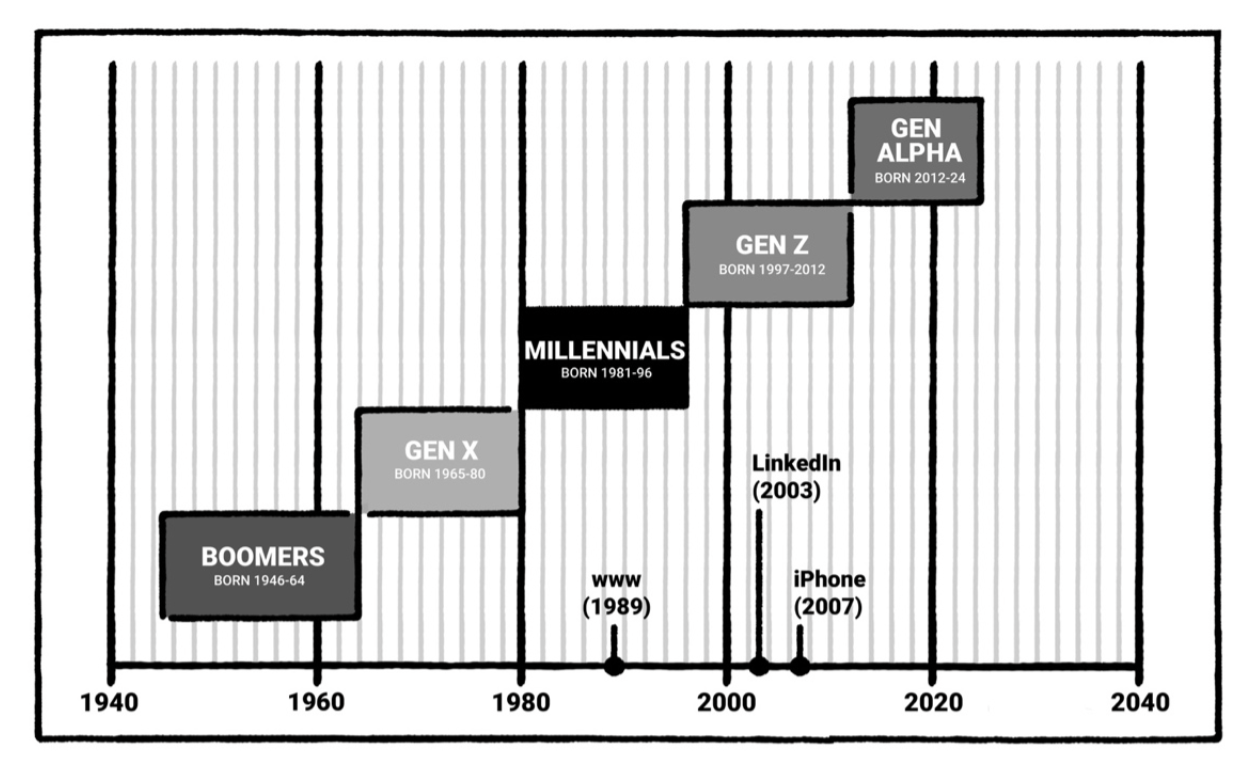Generational labels have become popular ways to describe how different age groups interact with technology, particularly social media. However, these categories often oversimplify the diverse ways each generation engages with the digital world. While Boomers, Gen X, Millennials, and Gen Z each bring unique perspectives and behaviours to social media, understanding the distinct ways each generation uses these platforms can offer valuable insights into their communication styles, values, and digital habits. Looking ahead, Gen Alpha—the youngest generation—will soon play a significant role in shaping the future of digital culture.
In this blog, we’ll explore how each generation navigates social media and highlight the key differences that define their digital experiences. What to expect:
- Digital Natives & Digital Immigrants
- Boomers on Social Media
- Gen X on Social Media
- Millennials on Social Media
- Gen Z on Social Media
- Gen Alpha: The Up-and-Coming Future
- Conclusion and Key Takeaways
Digital Natives & Digital Immigrants
When discussing how different generations interact with technology and social media, terms like “digital natives” and “digital immigrants” help us understand the differences between pre and post-millennial generations. US author Mark Prensky coined the term ‘digital native’ to describe the post-millennial generation who were born in the age of digital technology. Prensky said of digital natives: ‘Our students today are all “native speakers” of the digital language of computers, video games and the internet.’
The Chartered Institute of Marketing (CIM) Impact of Marketing report (2022) highlights that digital natives are becoming the majority population within the marketing community. We are seeing the rise of the first social media natives, and a rising sense of uncertainty among social media immigrants, who may have the preconception that younger people have better digital skills than they do. We must not assume that everyone born before 2000 struggles to use social media, and those born after 2000 find it easy. In Myths of Social Media (Chapter 19), Michelle Carvill and Ian MacRae suggest that there are two major problems with the myth that digital natives are all social media experts:
- This stereotype, like all stereotypes, is not universally true for all members of a group.
- Personal use of social media does not necessarily translate into effective use of social media for business.
The reality I see and hear is that digital skills and social media expertise cannot be solely attributed to age or generational labels. As technology continues to evolve at a rapid pace, both digital natives and immigrants face challenges in keeping up with the latest trends and advancements.

A timeline of generations
Generational cohorts are often characterised by unique experiences and traits. Boomers, born between the mid-1940s and mid-1960s, grew up during a time of economic growth and cultural change. They tend to value hard work, loyalty, and stability. Gen X, born between the mid-1960s and 1980, experienced a shift in societal norms and witnessed the rise of technology. They are often considered independent, adaptable, and resourceful. Millennials, born between the early 1980s and mid-1990s, are the first generation to grow up with widespread access to the internet and digital technology.
As true digital natives, Gen Z, born between the mid-1990s and early 2010s are characterised by constant connectivity and access to information. They are known for their tech-savviness, entrepreneurial mindset, and social activism, with a strong desire for authenticity, inclusivity and social change.
Generation Alpha, born from 2012 onwards, will start to reach the age of 13 (the minimum age for setting up social media accounts) in 2023. They are the first generation to be entirely born in the twenty-first century, to millennial parents.
How Different Generations Engage with Social Media
In social media, understanding how different generations engage with social media can be important for marketers aiming to craft effective, relevant content.
According to DataReportal’s 2024 Global Overview and Hootsuite’s Social Media Consumer Report, there are some subtle differences when cutting data by age. For example, younger people are more likely to use social media networks than they are to use chat and messaging apps.
Hootsuite also reported that all generations value organic content, versus paid content. Social media users, of every generation, appreciate content worth their time, reflecting an opportunity for brands to focus on organic growth and community-building efforts.
Boomers on Social Media: The Traditionalists (Born 1946-1964)
Boomers, often perceived as late digital adopters, have increasingly embraced social media.
While traditionally seen as more conservative in their social media use, they also engage significantly with content that aligns with their values. This generation values content that is direct and informative.
- Main Reasons for Using Social Media: Primarily to connect with friends and family and to stay updated with news stories.
- Daily Time Spent: Generally spend less time than younger generations, around 1.5 hours daily.
- Average Number of Social Platforms Used: Active on fewer platforms, around 4 to 5 on average.
- Favourite Social Media Platforms: Tend to favour Facebook for its ability to connect with family and to access news.
- Seeking Out Brands: Engage with brands on social media but to a lesser extent compared to younger demographics.
- Use of Social Media for Brand Research: Still use social media for brand research, particularly when it aligns with personal interests.
- Following Influencers: Least likely to follow influencers; however, they do value expert opinions and recommendations.
- Social Media as a News Source: Highly value social media as a source for news and staying informed on current events.
How To Effectively Engage with Boomers on Social Media
Boomers appreciate content that’s clear and accessible, avoiding the fluff for more substance.
They are likely to follow a brand for its educational content and if it offers a good service or product. However, compared to younger generations, Boomers show a strong preference for brands to abstain from discussing political and religious content on social media.
For Boomers, building trust through dependable customer service and highlighting brand stability can enhance engagement. Creating opportunities for connection through shared interests and focusing on content that serves as a reliable news source will keep them coming back.
To engage Boomers effectively, brands should focus on producing content that reflects reliability and trustworthiness, offers useful information, and steers clear of polarizing topics. Remember, this generation values practicality and straightforward communication.
Gen X on Social Media: The Bridge Generation (Born 1965-1980)
Gen Xers were the first to experience the Internet revolution, making them adept at balancing traditional and digital media. They appreciate transparency and sincerity, making them more likely to engage with brands that exhibit authenticity.
- Main Reasons for Using Social Media: Family connections take precedence, along with news consumption and filling spare time.
- Daily Time Spent: Around 2 hours, with less time spent compared to younger generations.
- Average Number of Social Platforms Used: Engage with about 5 to 6 different platforms on average per month.
- Favourite Social Media Platforms: Prefer WhatsApp for communication and Facebook for a mix of news and social interaction.
- Seeking Out Brands: Show a considerable interest in brands on social media, though not as actively as younger generations.
- Use of Social Media for Brand Research: Likely to research brands on social media, especially when making informed purchasing decisions.
- Following Influencers: Some interest in following influencers, though not as high as younger users.
- Social Media as a News Source: A significant source of news, often equal to or exceeding younger generations.
How To Effectively Engage with Gen X on Social Media
For Generation X, nostalgia marketing can be an incredibly effective strategy.
Tapping into the nostalgia of Gen Xers by referencing pop culture from their youth can evoke an emotional connection. Content that focuses on family values or offers practical advice on topics like health and finance will also resonate.
Content that fuels buying behaviour for Gen X isn’t limited to paid advertising; in fact, organic and shared content significantly influences their purchasing decisions.
Social media managers should ensure that news-based content is easily digestible and shareable to cater to their preference for straightforward, reliable news sources.
Millennials on Social Media: The Digital Pioneers (Born 1981-1996)
As true digital pioneers, Millennials are accustomed to the online world. They value authenticity and community-driven content, often seeking brands that align with their ethical values. For Millennials, social media is not just a tool for socialising but also a means to engage with brands on a deeper, more personal level.
- Main Reasons for Using Social Media: To stay in touch with friends and family, consume news, and for entertainment.
- Daily Time Spent: On average, about 2 hours and 30 minutes, with a balance between content consumption and social interaction.
- Average Number of Social Platforms Used: Use slightly fewer platforms than Gen Z, around 6 to 7 on average.
- Favourite Social Media Platforms: Strong preference for Facebook and Instagram, along with significant use of WhatsApp. However, Pew Research Center reported a 14% increase in millennials on the platform.
- Seeking Out Brands: Quite engaged in seeking out brands on social media, especially through peer recommendations and influencers.
- Use of Social Media for Brand Research: Frequently use social media to research brands, slightly less than Gen Z but still very prominent.
- Following Influencers: Follow influencers to a significant extent, though slightly less than Gen Z.
- Social Media as a News Source: Use social media as a primary source of news regularly.
How To Effectively Engage with Millennials on Social Media
Millennials resonate with content that nurtures a community ethos and aligns with their ethical standards. Social media managers should focus on crafting content that not only educates and informs but also facilitates a two-way conversation.
Transparency goes a long way with this age group; content that illustrates a brand’s commitment to social responsibility or that offers a behind-the-scenes glimpse can improve trust and loyalty.
Additionally, incorporating work-life content and providing news updates can add to Millennials’ desire for personal development and staying informed.
Gen Z on Social Media: The Digital Natives (Born 1997-2012)
Gen Z represents the first generation that has grown up entirely within the digital age, making them exceptionally comfortable with technology and new media platforms. Known for their short attention spans, they prefer quick, visually appealing content that is also interactive.
- Main Reasons for Using Social Media: Predominantly to connect with friends and family and to fill up spare time.
- Daily Time Spent: Among the highest, averaging around 3 hours, with video content being particularly popular.
- Average Number of Social Platforms Used: They are active on multiple platforms, around 7 to 8 on average.
- Favourite Social Media Platforms: Prefer platforms like Instagram and TikTok, also showing a notable presence on WhatsApp.
- Seeking Out Brands: A significant number actively seek out and engage with brands on social media.
- Use of Social Media for Brand Research: Very likely to use social media to research brands and products before purchasing.
- Following Influencers: A large proportion follows influencers or experts on social media.
- Social Media as a News Source: A notable amount uses social media as a source of news, but not as prominently as older generations.
How To Effectively Engage with Gen Z on Social Media
When engaging Generation Z, social media managers should prioritise vibrant, snappy content that leverages the visual appeal of platforms like Instagram and TikTok.
This generation values authenticity; hence, content that’s raw and real will strike a chord — think less airbrushed perfection and more genuine moments.
They are more open than older generations to brands discussing politically and socially charged topics like gender and racial equity. However, a notable segment prefers brands to sidestep overt discussions on politics, religion, and sexuality.
Collaborating with influencers who genuinely connect with their audience can extend your reach within this demographic.
For Gen Z, a brand’s vibe, aesthetics, and creativity on social media significantly influence their decision to follow and engage. They are drawn to authentic communication, content that inspires, and timely responses to current events.
This generation is not just about superficial browsing; over half shop online and scrutinise the aesthetics of what they buy, particularly on social platforms. To resonate with Gen Z, brands should emphasise visual storytelling and take a stand on issues without being overly political or divisive.
Generation Alpha on Social Media: The Future Influencers (Born 2013-Present)
The children of Millennials, Generation Alpha, are just beginning to interact with media, largely through platforms managed by their parents.
This generation is expected to be the most technologically integrated, making it essential for marketers to anticipate more interactive and immersive digital experiences.
Content for this group is still largely targeted at their parents but should start considering the early digital habits forming for these future influencers and customers.
Key Takeaways on How Different Generations Engage with Social Media
Social media isn’t one-size-fits-all when it comes to how different generations engage with social media and generational nuances play a critical role in shaping online engagement. The key is to offer content that is organic and engaging, promoting community-building rather than hard selling.
- Authenticity Resonates: All generations, particularly Gen Z, are drawn to genuine storytelling and brands with ethical practices.
- Value-Driven Content: Across the board, users prefer organic content that provides value, education, and an authentic connection.
- Visual Appeal for Younger Audiences: Gen Z and Millennials are attracted to visually aesthetic and creative content.
- Written Detail Matters: Contrary to assumptions, detailed text and instructions are important for younger audiences to understand complex information.
- Conversations Over Information Dumps: Young people prefer engaging dialogues to passive reception of information, indicating a preference for interactive and responsive content strategies.
How do you think the ways in which different generations engage with social media are shaping social media marketing activities?

